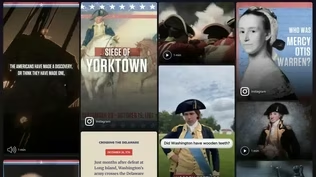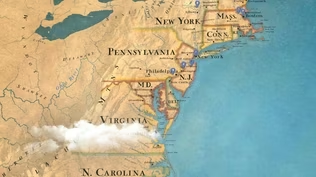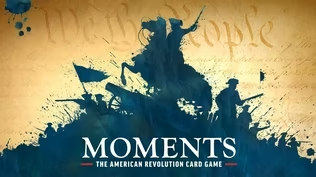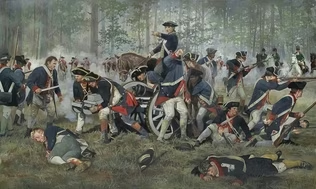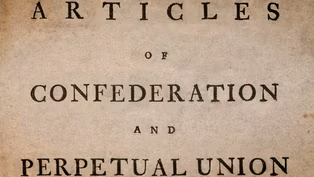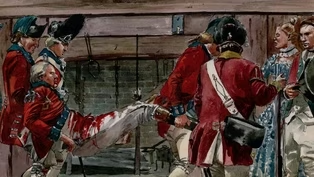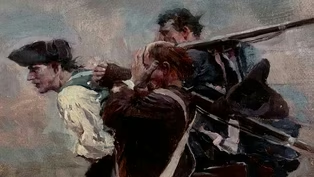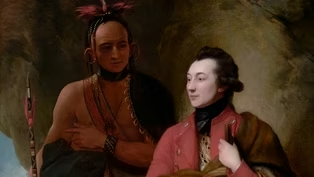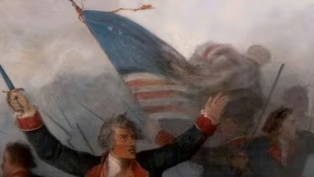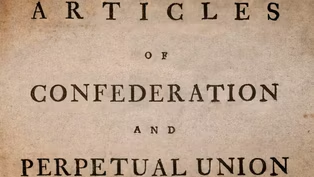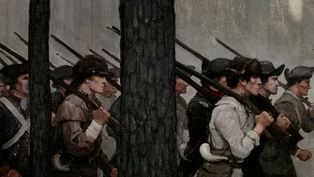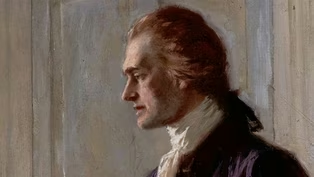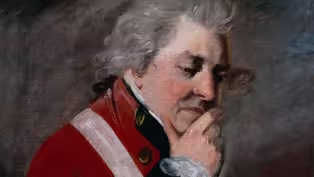
Patriot Victory at the Battle of Saratoga
Clip: Episode 4 | 8m 59sVideo has Closed Captions
After days of fighting at Saratoga, Benedict Arnold and Horatio Gates secure a Patriot victory.
The Continental Army at Saratoga swells to 17,000 as it once again clashes with the British, led by General John Burgoyne. Benedict Arnold is seriously wounded while leading the troops, but the Patriots are successful in pushing back the British. Completely surrounded with dwindling supplies, Burgoyne has little choice but to surrender to Horatio Gates in a major victory for the Patriots.
Problems playing video? | Closed Captioning Feedback
Problems playing video? | Closed Captioning Feedback
Episodes presented in 4K UHD on supported devices. Corporate funding for THE AMERICAN REVOLUTION was provided by Bank of America. Major funding was provided by The Better Angels Society and...

Patriot Victory at the Battle of Saratoga
Clip: Episode 4 | 8m 59sVideo has Closed Captions
The Continental Army at Saratoga swells to 17,000 as it once again clashes with the British, led by General John Burgoyne. Benedict Arnold is seriously wounded while leading the troops, but the Patriots are successful in pushing back the British. Completely surrounded with dwindling supplies, Burgoyne has little choice but to surrender to Horatio Gates in a major victory for the Patriots.
Problems playing video? | Closed Captioning Feedback
How to Watch The American Revolution
The American Revolution is available to stream on pbs.org and the free PBS App, available on iPhone, Apple TV, Android TV, Android smartphones, Amazon Fire TV, Amazon Fire Tablet, Roku, Samsung Smart TV, and Vizio.
Buy Now
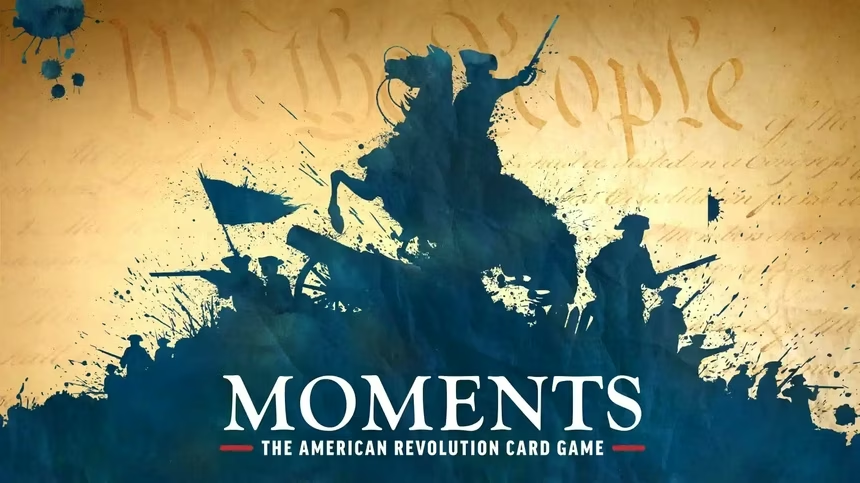
MOMENTS: The Revolutionary War Card Game
Use your knowledge of Revolutionary-era moments to build a timeline of real historical events.Providing Support for PBS.org
Learn Moreabout PBS online sponsorshipVoice: The armies were so near that not a night passed without firing.
No foraging party could be made without great detachments to cover it.
I do not believe either officer or soldier ever slept during that interval.
General John Burgoyne.
Narrator: For eighteen days after the Battle of Freeman's Farm near Saratoga, the American and British armies strengthened their defenses and skirmished constantly but remained precisely where they had been when the shooting stopped.
Meanwhile, Loyalist refugees continued to stream into the British camp, forcing Burgoyne to reduce rations by a third.
Desertions, especially among German troops, rose so fast that Baron Riedesel promised his soldiers ten guineas for every would-be deserter they brought back and five guineas if he had to be shot for resisting.
At 11:00 in the morning on October 7th, Burgoyne led some 1,500 men out of his camp and formed a long, thin line across two unharvested wheat fields just west of Freeman's Farm, redcoats on the right, Germans in the center, elite British grenadiers on the left.
While some of his men harvested the wheat his encampment desperately needed, Burgoyne and several of his officers climbed onto the roof of a log cabin with spyglasses, trying to see if there was a way around the rebel left.
Tall trees blocked them from seeing anything useful, but Americans patrolling the no man's land saw them.
[Musket fire] Shots were exchanged.
From Bemis Heights, General Gates now ordered Daniel Morgan's corps and Brigadier General Enoch Poor's brigades to attack the British on both flanks.
British General Fraser was killed.
The redcoats crumbled.
Then Benedict Arnold galloped onto the battlefield.
He seemed to be everywhere, leading a charge against the British center, racing between the armies through a swarm of musket balls to rally another regiment so that they could sweep the defenders from two fortified cabins.
He urged the exhausted men on to seize a redoubt manned by some 200 German grenadiers.
Voice: You cannot conceive how men looked.
And at first it appeared to me that if the order came for us to march, I could not do it.
Nathaniel Bacheller.
Narrator: But when Arnold gave the order, Bacheller and his comrades climbed to their feet and moved forward again, shouting as they rushed toward the front of the redoubt.
Arnold rode around it, forced his way inside, and demanded that its defenders surrender.
Most did surrender or fled, but one fired a musket ball that shattered Arnold's left leg, the same leg that had been wounded at Quebec two years before, and killed his horse, which fell on him.
Unable to move, Arnold continued to shout orders until the fighting died down and he could be carried from the field.
"Arnold was our fighting general," one of his men remembered.
"He was as brave a man as ever lived."
Philbrick: I think it's safe to say that Benedict Arnold should be regarded as the hero of Saratoga.
It was really an aggressive move at the end that sealed the victory for the Americans.
Narrator: The British stumbled back to Saratoga, carrying their wounded with them.
[Cannons firing] Voice: October 10th--Saratoga.
A frightful cannonade began, principally directed against the house in which we had sought shelter, probably because the enemy believed that all the generals made it their headquarters.
Alas!
It harbored none but wounded soldiers or women.
We were finally obliged to take refuge in a cellar.
My children laid down on the earth with their heads upon my lap.
My own anguish prevented me from closing my eyes.
Eleven cannonballs went through the house, and we could plainly hear them rolling over our heads.
One poor soldier, whose leg they were about to amputate, had the other leg taken off by another cannonball in the very middle of the operation.
[Baroness Riedesel] [Cannons firing] Narrator: Militiamen continued to stream into Gates' army, its numbers now swollen to 17,000.
By October 13th, the Americans had Burgoyne's army completely surrounded.
Voice: Every hour, the position of the army grew more critical and the prospect of salvation grew less and less.
Even for the wounded, no spot could be found which could afford them a safe shelter.
The sick and wounded would drag themselves along into a quiet corner in the woods, and lie down to die.
General Riedesel.
♪ Conway: Saratoga was a body blow to the British.
It was clear that all of the old assumptions, that the British Army was a professional force that would sooner or later prevail over the amateurish Americans, all those assumptions were undermined.
The amateurish Americans had actually beaten the British.
For the British, this was not just a military defeat; it was a psychological blow of very considerable proportions.
Narrator: That afternoon, Burgoyne gathered his staff.
They were trapped, without food or forage.
They voted to begin negotiations with General Gates.
♪ For three days, messages flew back and forth between the camps.
Voice: During the time of the cessation of arms, a soldier in the 9th Regiment named Maguire came down to the bank of the river with a number of his companions, who engaged in conversation with a party of Americans on the opposite shore.
♪ Maguire suddenly darted like lightning from his companions, and resolutely plunged into the stream.
[Water splashing] At the very same moment, one of the American soldiers, seized with a similar impulse, resolutely dashed into the water from the opposite shore.
The wondering soldiers on both sides beheld them eagerly swim towards the middle of the river, where they met.
They hung on each other's necks and wept.
They were brothers.
One was in the British and the other in the American service, totally ignorant until that hour that they were engaged in hostile combat against each other's life.
Roger Lamb.
♪ Narrator: On the morning of October 17th, Gates' generous terms were accepted.
He and Burgoyne met between their respective lines and shook hands.
Burgoyne presented his sword to Gates-- who handed it back, as dictated by military custom.
To his dying day, Burgoyne would blame others for his defeat-- Lord Germain, General Howe, his Loyalist German and Native allies-- everyone but himself.
Voice: All the army gave up and surrendered themselves prisoners of war to our men.
Such a thing was never heard of.
Such a sight was never seen before, so many men giving in to us.
Exult, oh, Americans and rejoice and praise the Lord, who hath done wonderful things for you.
Ezra Tilden.
Narrator: An entire British army had been forced to lay down its arms-- one lieutenant general, two major generals, three brigadiers, 350 commissioned and staffed officers, 5,900 other ranks, and some 600 women and children.
Along with them, the Americans seized 30 artillery pieces, 60 wagons, 1,500 swords, 3,400 bayonets, and 4,600 muskets and rifles.
Video has Closed Captions
Clip: Ep4 | 2m 14s | The Articles were weak by design and left Congress unable to pay soldiers in the Continental Army. (2m 14s)
Video has Closed Captions
Clip: Ep4 | 6m 18s | General Horatio Gates' force clashes with the British, beginning the Battle of Saratoga. (6m 18s)
The British Capture Philadelphia & The Battle of Germantown
Video has Closed Captions
Clip: Ep4 | 6m 29s | The British seize Philadelphia, but Washington plans to retake the city at the Battle of Germantown. (6m 29s)
The Haudenosaunee Choose Sides in the American Revolution
Video has Closed Captions
Clip: Ep4 | 8m 7s | The Six Nations of the Haudenosaunee choose opposing sides at the Battle of Oriskany. (8m 7s)
Video has Closed Captions
Clip: Ep4 | 1m 9s | Artistic renderings of the Revolution often include the flag, but little is known about its origins. (1m 9s)
Preview: Conquer by a Drawn Game
Video has Closed Captions
Preview: Ep4 | 30s | Philadelphia falls, but the American victory at Saratoga allows France to enter the war. (30s)
The Real People Who Fought the American Revolution
Video has Closed Captions
Clip: Ep4 | 4m 31s | Washington uses bonuses and drafts to encourage Americans to join the Continental Army. (4m 31s)
Religion & the Revolutionaries
Video has Closed Captions
Clip: Ep4 | 2m 5s | Most revolutionaries were Protestants, but there were also Catholics, Jews, and Muslims. (2m 5s)
Saratoga: A Psychological Turning Point
Video has Closed Captions
Clip: Ep4 | 33s | Historian Stephen Conway on the psychological impact of Saratoga on the British. (33s)
Turning the Tide in New Jersey
Video has Closed Captions
Clip: Ep4 | 59s | With Washington commanding less than 3,000, the winter of 1777 became a fight over supplies. (59s)
Providing Support for PBS.org
Learn Moreabout PBS online sponsorshipSupport for PBS provided by:
Episodes presented in 4K UHD on supported devices. Corporate funding for THE AMERICAN REVOLUTION was provided by Bank of America. Major funding was provided by The Better Angels Society and...

